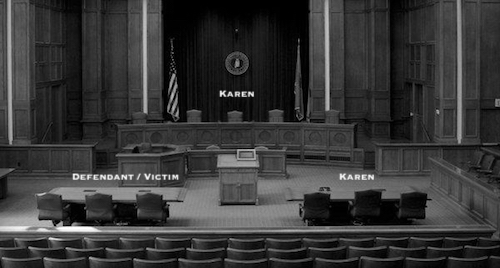Imagine that two people are doing something that is voluntary, consensual, and peaceful. Now imagine that a third person — let’s call her Karen — objects to what they’re doing, not because it directly affects her, but because she disapproves.
‘I don’t like what they’re doing’, she says, ‘so I will go to court to stop them from doing it’.
But even if she makes it to court, the judge is likely to rule that she doesn’t have standing to pursue her case, precisely because it doesn’t directly affect her.
Now suppose that Karen and a lot of others who feel the same way convince their elected representatives to enact a statute prohibiting people from engaging in this voluntary, consensual, peaceful activity.
Karen still can’t go to court. She still doesn’t have standing. But now ‘the state’ can take Karen’s place. The state has standing in criminal cases, even when there is no victim, although it’s not clear why it should.
In any case, Karen still isn’t affected by the activity. No one else is. But a fictional entity that can’t possibly be harmed can claim that it is harmed, allowing it to stand in for her.
In this sense, the state has become a Virtual Karen™️, which magically has standing to interfere in the private affairs of its citizens — not to protect anyone in particular, but to enforce particular policies that harmonize with the prejudices of the Karen Majority™️.
Which is bad enough — but while the real Karen couldn’t even get into court, Virtual Karen™️ gets two seats: at the prosecutor’s table and on the bench.
There are so many levels of craziness here that once you see what’s going on, it’s hard to get your head around it . There is a simple, straightforward way to deal with this: Just eliminate standing for Virtual Karen™️ in criminal cases.
This one step would ameliorate many of the problems that we’ve recently seen coming to a head, by eliminating a lot of unnecessary police activity: No undercover or sting operations, no manufactured violations, no policing for profit… and consequently, fewer opportunities to kneel on a suspect’s neck, or place him in a choke hold; to shoot suspects lying prone in hotel hallways or running away from traffic stops; to execute SWAT raids on the homes of innocent persons; to conduct warrantless searches; and so on.
The police could get back to doing their actual job — protecting our rights by collecting evidence of crimes, and making sure that persons accused of those crimes show up in court. And the rest of us could stop looking over our shoulders, fearful that the Agents of Karen™️ might be looking for excuses to arrest us for violating ‘laws’ to which we never consented, and often don’t even know about.
But it’s unlikely to be implemented, because — as recent experience has shown — nearly everyone has some issue on which he or she is a Karen. And so we will continue to get the Karenocracy™️ that we deserve.
